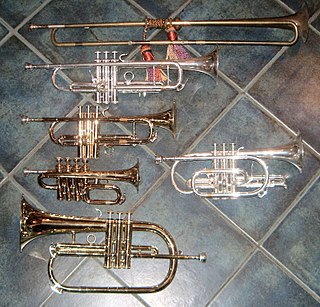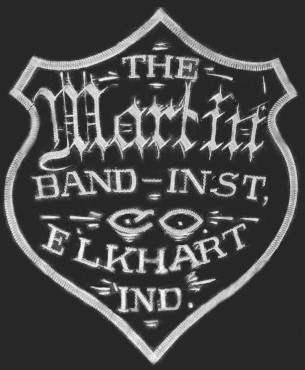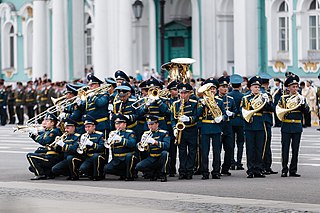Related Research Articles

A brass instrument is a musical instrument that produces sound by sympathetic vibration of air in a tubular resonator in sympathy with the vibration of the player's lips. Brass instruments are also called labrosones or labrophones, from Latin and Greek elements meaning 'lip' and 'sound'.

The cornet is a brass instrument similar to the trumpet but distinguished from it by its conical bore, more compact shape, and mellower tone quality. The most common cornet is a transposing instrument in B♭. There is also a soprano cornet in E♭ and cornets in A and C. All are unrelated to the Renaissance and early Baroque cornett.

The cornett, cornetto, or zink is a wind instrument that dates from the Medieval, Renaissance and Baroque periods, popular from 1500 to 1650.
C. G. Conn Ltd., Conn Instruments or commonly just Conn, is a former American manufacturer of musical instruments incorporated in 1915. It bought the production facilities owned by Charles Gerard Conn, a major figure in early manufacture of brasswinds and saxophones in the USA. Its early business was based primarily on brass instruments, which were manufactured in Elkhart, Indiana. During the 1950s the bulk of its sales revenue shifted to electric organs. In 1969 the company was sold in bankruptcy to the Crowell-Collier-MacMillan publishing company. Conn was divested of its Elkhart production facilities in 1970, leaving remaining production in satellite facilities and contractor sources.

The Vincent Bach Corporation is a US manufacturer of brass instruments that began early in the early Twentieth Century and still exists as a subsidiary of Conn-Selmer, a division of Steinway Musical Instruments. The company was founded in 1918 by Austrian-born trumpeter Vinzenz Schrottenbach.
Conn-Selmer, Inc. is an American manufacturer of musical instruments for concert bands, marching bands and orchestras. It is a wholly owned subsidiary of Steinway Musical Instruments and was formed in 2003 by combining the Steinway properties, The Selmer Company and United Musical Instruments.

Holton is a brand owned by the Conn-Selmer division of Steinway Musical Instruments. The original business was a used instrument shop began in 1898 by American trombone player Frank Holton in Chicago, Illinois. The firm built brass instruments for ten years in Chicago, then in Elkhorn, Wisconsin from 1918 until 2008, when production of Holton-branded instruments moved to Eastlake, Ohio. The business remained independent until it was acquired by Leblanc in 1964. Leblanc was acquired by Conn-Selmer in 2004 and its properties became subsidiaries of Conn-Selmer.

The Martin Band Instrument Company was a musical instrument manufacturer in Elkhart, Indiana. The firm produced band instruments, including trumpets, cornets, fluegelhorns, trombones, and saxophones from 1908 through the 1960s. The brand was acquired by the Leblanc Corporation in 1971 and discontinued in 2007 after Leblanc's 2004 acquisition by Conn-Selmer.

Herbert Lincoln Clarke was an American cornetist, feature soloist, bandmaster, and composer. He is considered the most prominent cornetist of his time.

A brass band is a musical ensemble generally consisting primarily of brass instruments, most often with a percussion section. Ensembles that include brass and woodwind instruments can in certain traditions also be termed brass bands, but may be more correctly termed military bands, concert bands, or "brass and reed" bands.
Steinway Musical Instruments, Inc. is a worldwide musical instrument manufacturing and marketing conglomerate, based in Astoria, New York, the United States. It was formed in a 1995 merger between the Selmer Industries and Steinway Musical Properties, the parent company of Steinway & Sons piano manufacturers. From 1996 to 2013, Steinway Musical Instruments was traded at the New York Stock Exchange (NYSE) under the abbreviation LVB, for Ludwig van Beethoven. It was acquired by the Paulson & Co. private capital firm in 2013.

The brass section of the orchestra, concert band, and jazz ensemble consist of brass instruments, and is one of the main sections in all three ensembles. The British-style brass band contains only brass and percussion instruments.

F. E. Olds was a manufacturer of musical instruments founded by Frank Ellsworth Olds in Los Angeles, California in the early 1900s. The company made brass instruments, especially trombones, cornets, and trumpets.
The Getzen Company is a family-owned manufacturer and wholesaler of brass instruments. The present product portfolio consists of trumpets, cornets, flugelhorns, trombones, and a baritone horn. Four generations of the Getzen family have participated in the company. Most Getzen instruments are rated well by consumers, and it is well known for its custom line of Edwards trumpets and trombones.

King Musical Instruments is a former musical instrument manufacturing company located in Cleveland, Ohio, that used the trade name King for its instruments. In 1965 the company was acquired by the Seeburg Corporation of Eastlake, Ohio, and the name changed to "King Musical Instruments".
The Boston Musical Instrument Company was an American manufacturer of brass band instruments in the late 19th and early 20th centuries located in Boston, Massachusetts.

Ernst Albert Couturier was best known as a cornet player who toured as a "virtuoso" performer on the concert programs of bands of the day. He promoted the Holton Band Instrument Company for a decade in that capacity before applying his own unique inventions to the production of his own line of brass band instruments between 1918 and 1923.

Chicago Musical Instruments Co. (CMI), later known as Norlin Music, was a manufacturer and distributor of musical instruments, accessories, and equipment, which at times had controlling interests in Gibson Guitars, Standel, Lowrey, F. E. Olds & Son, William Lewis & Son Co., Krauth & Beninghoften, L.D. Heater Music Company, Epiphone Guitars, Selmer UK, Moog, and other musical instrument brands. In the mid-1970s, the company was the largest manufacturer of musical instruments in the United States.
The York Band Instrument Company was a musical instrument manufacturer in Grand Rapids, Michigan.
References
- 1 2 3 4 5 "Foster A. Reynolds". Contempora Corner. Archived from the original on 2013-01-19. Retrieved 2010-07-26.
- ↑ "Checklist of Instruments by Graves & Company". National Music Museum. University of South Dakota. Archived from the original on 2010-01-24.
- 1 2 Dundas, Richard, 20th Century Brass Musical Instruments in the United States, p.49
- ↑ "Ohio Band Instrument Company". Contempora Corner. Archived from the original on 2010-09-09. Retrieved 2010-10-27.
- ↑ School Musician Magazine, Volume 32, F.L. McAllister, 1960, P.57
- ↑ "The F. E. Olds Story of Tradition and Quality". F.E. Olds. Archived from the original on 2010-06-19.